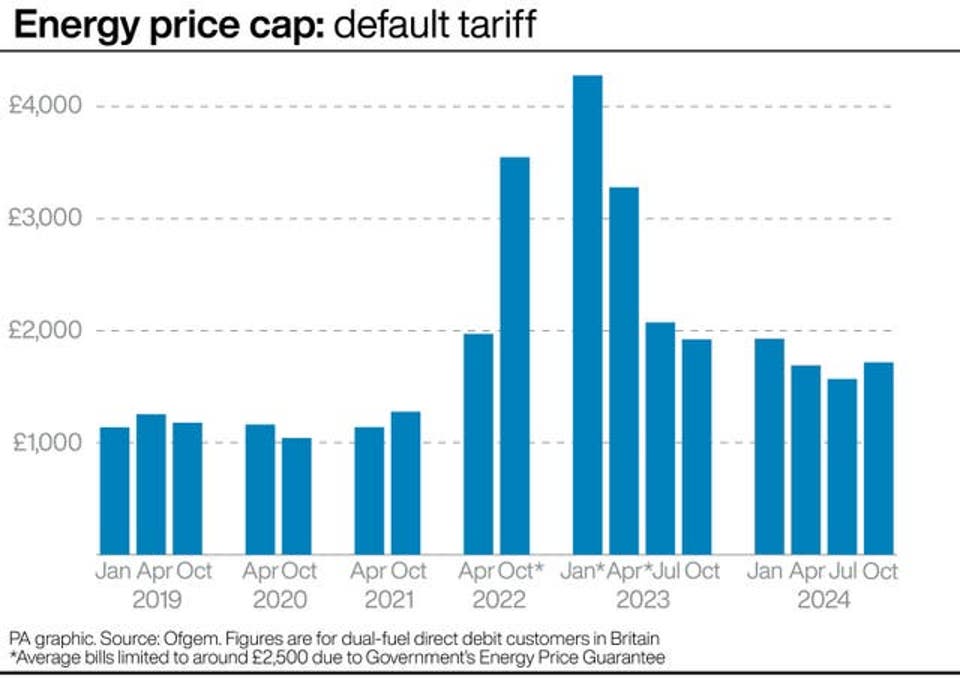Energy bosses meet minister as Chancellor defends winter fuel payment squeeze

Chancellor Rachel Reeves has defended her decision to strip winter fuel payments from millions of pensioners as energy bosses were called in for talks on helping vulnerable households during the dark and cold months ahead.
Executives from Centrica, EDF, E.On, Octopus Energy, Scottish Power, Good Energy, Rebel Energy, Ovo, So Energy, Ecotricity and Utility Warehouse are expected at the roundtable event with the Government.
Industry body Energy UK, the regulator Ofgem, and Citizens Advice will also attend the meeting with energy consumers minister Miatta Fahnbulleh.
The average household energy bill is to increase by £149 from October after Ofgem said it was increasing its price cap as homes approach the winter months.

At the same time, the Government is withdrawing winter fuel payments from millions of pensioner households not in receipt of benefits.
Ms Reeves defended that decision, which she blamed on a £22 billion black hole in the public finances inherited from the Conservatives.
“It’s not a decision I wanted to make,” she said.
“It was a decision that I had to make in incredibly challenging circumstances to put our public finances on a firm footing.”
The Government’s policy on winter fuel payments will stop the handouts for people in England and Wales who are not in receipt of Pension Credit or other means-tested benefits.
It is expected to reduce the number of pensioners in receipt of the up to £300 payment by 10 million, from 11.4 million to 1.5 million, saving some £1.4 billion this financial year.
Sir Keir Starmer has faced demands to U-turn on the plan, with pressure inside his party, from political opponents and from campaigners.
Charity Age UK said it “strongly” opposes means-testing the payment because it means “as many as two million pensioners who badly need the money to stay warm this winter will not receive it and will be in serious trouble as a result”.

Simon Francis, co-ordinator of the End Fuel Poverty Coalition, said: “In real terms, the changes this winter mean that some older people will face the highest energy bills on record.
“This has the potential to create a public health emergency which will actually create more pressure on the under-pressure NHS which the Prime Minister says he wants to fix.”
The meeting on Wednesday is expected to cover the measures suppliers will take this winter to help those already in energy debt and stop others from falling into it.
Ministers hope and expect suppliers to commit to going substantially further than the voluntary measures they offered last winter.
Ofgem’s decision on the price cap will see it increase by 10% from the current £1,568 for a typical household in England, Scotland and Wales to £1,717.
It is, however, around £117 cheaper than the cap in October last year, which was £1,834.
Rising prices in the international energy market, due to heightened political tensions and extreme weather events, were the main driver behind the decision.
It means households will be going into the colder months facing higher bills than since April when the cap was lowered.
Citizens Advice chief executive Dame Clare Moriarty said more people could claim pension credit to ensure they kept their winter fuel payments.
She told BBC Radio 4’s Today that 1.4 million receive pension credit but “there’s nearly another 900,000 people who could, so it’s really important to see better support so that people do access that benefit”.
She said she will be asking for action from both suppliers and from the Government.
“Suppliers really need to step up to the responsibilities that they have to their customers to make sure that if people are struggling they can have repayment plans, supporting people with energy efficiency so they spend less in the first place, making sure that people can get access to debt advice.
“But it also needs the Government to recognise the need for targeted support and that’s something that we would very much like to see coming out of the meeting later on today.”
Emma Pinchbeck, chief executive of industry body Energy UK, said the sector provided “£54 million of discretionary support, on top of the more than £2 billion worth of mandatory schemes” for vulnerable households.
But she called for green policy costs to be shifted from bills to general taxation to help ease the burden.
“We’ve got record levels of debt amongst our consumers. It is, if anything, worse than any other time in the crisis,” she said.
“And so we’ve been advocating quick things to do, and we think a smart thing to do would be to move a portion of the policy costs off electricity bills into general taxation to rebalance some of the costs between electricity and gas, and to, lastly, double the warm homes discount.”
The meeting comes after an influential committee found efforts to reduce fuel poverty had flatlined over the past five years.
Committee on Fuel Poverty chairwoman Caroline Flint said: “For too many low-income households, the unaffordability of bills, especially in the coldest months, is all too real.
“We foresee that targeted financial support, possibly including the use of social tariffs, for vulnerable and low-income households may be needed for some years to come.”